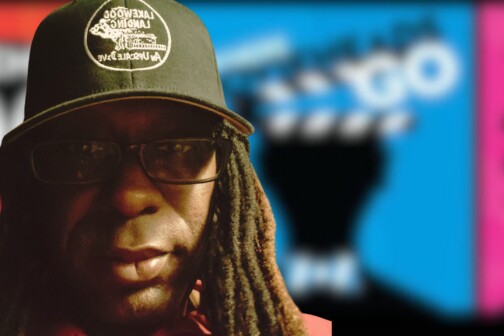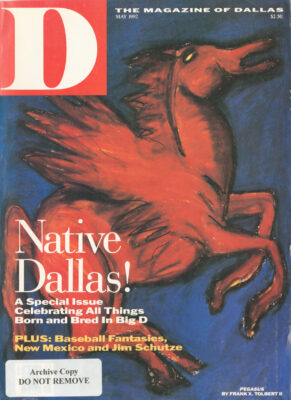You’re from Big D. I can guess By the way you drawl and the way you dress. You’re from Big D. My, oh yes.
I mean, Big D, little a, double l-a-s!
And that spells Dallas
My darlin’, darlin’ Dallas.
Scott Waara is a bubba’s bubba.
Granted, he stands at the drop-dead pinnacle of commercial culture, the New York stage of the Booth Theatre on Shubert Alley. But amid the squalid glamour of Times Square he’s still a cowboy-a cowboy gone ultra-urban.
Right now he’s also Dallas’ man on Broadway. There, on that altar of Midtown chic, Waara rolls his aw-shucks eyes in a baby face that looks chubbed up on Tex-Mex. In this season’s revival of The Most Happy Fella he plays Herman, who wears his jeans like a breakfast sausage wears its skin after frying: chewy but low slung. When he asks the woman he fancies to let him hear a tittle of her distinctive dialect it reminds us of home.
“Would you mind sayin’,” he asks Cleo, “Neiman Marcus?”
From there, Waara and Liz Larsen as Cleo stomp into a knees-up hoot of the show’s big number Big D.
Where ev’ry home’s a palace
’Cause the settlers settle for no less
Hooray for Big D.
Hooray, indeed. Dallas trained Waara to do the Tony-worthy supporting role he’s delivering eight times a week as Herman. He graduated from the Theatre Division of SMU’s Meadows School of the Arts in 1979 and “those years in Dallas really do keep it real for me,” he says. “My time at SMU resonates when I do the show. And when you’re in a silly musical comedy like this one, you use anything you can.”
True, The Most Happy Fella is silly, with a Big S. It was first seen on Broadway right across the street from where Waara’s doing it today, at the Imperial Theatre, 36 years ago this month. Frank Loesser based the show’s book on a 1924 Pulitzer Prize-winning play by Sidney Howard. It’s about an Italian owner of a Napa vineyard who woos a San Francisco waitress. Loesser also wrote the music and lyrics that kept the original production running a handsome 676 performances, fueled by four rave reviews and three strongly positive ones. Now retooled into an intimate chamber musical accompanied by just two Steinways, the show is beguiling Broadway audiences with the human scale of its silliness. Preposterous as it is, it’s also spirited. It recalls hope. It’s unafraid of the grand gesture.
Remember the grand gesture?
Waara certainly learned it, almost in spite of himself, while here. “I’ve always said I didn’t realize until I’d worked several years in what good stead my time in Dallas left me,” he says. “SMU’s training was excellent.” It’s thanks to that training that he is nightly cracking up the house hopping around with a farm basket over his head. He shares his SMU background with Dallas natives Buddy Crutchfield and Gail Pen-nington, who have smaller roles in The Most Happy Fella.
But Waara is in a quandary these days. “I’ve been fortunate the last few years to stay in New York and work, ” he says, “but now I’m thinking about how the most important thing for an actor is that you gotta have a life. It’s really just a job.”
The guy’s on Broadway and he’s saying that acting is “just a job”?
Well, yeah. Waara, you see, is turning 35 and growing up. “I’m realizing I don’t have to stay in the one-room apartment in the Village I moved into 11 years ago when I was a kid. I’m taking a real apartment. Uptown. And, you know, every night I grieve for the little apartment I’m leaving. I still wear my white baseball cap. I’m still a boy inside. The childhood imagination that is so valued in acting-it may keep us looking 10 years younger than anyone else, but it’s hard keeping that alive while you’re shouldering the realities of an adult life.”
Waara has been back to Dallas a couple of times since SMU to do shows at the Plaza, but he’s been gone much too long to realize how spookily he’s nailing something that Dallasites are facing, too.
On the way to its own civic adulthood, Dallas isn’t just passing some remarkable milestones, it’s running smack into them. Broadsided by the oil/real estate bust, then the recession, Dallasites are hard pressed to get a leg up on that legendary ’Big D’ kick.
When Larsen as Cleo sings, “Just dig your toe in Dallas and there’s oil all over your address,” you can tell the Dallasites in the Booth Theatre audience: We’re the ones weeping.
So look,: my darlin’, darlin’, Dallas.”
As long as we’re all here, natives and transplants alike, hunkered down in these hard times and waiting for the good… and as long as we have to buy a plane ticket to go see the superb Waara on stage in New York (call the Broadway Show Line at (212) 563-BWAY or Telecharge at (800) 233-3123 for tickets)… and as long as the biggest thing to hit our local arts scene this spring has been a Dallas Museum of Art exhibit of medieval treasures we had only because another bubba stole them from the town of Quedlinburg in Germany… as long as Big D can seem so very “little d” these days, let’s look to what should be the soul of a community’s life: our cultural scene and, particularly, theater.
Why theater? Because it’s the art you don’t have to have any technical training to enjoy at full pitch. We all can love high dance and great music and precious visual arts. But for each of those, knowing a certain language of technique goes a long way to understanding and appreciating them.
In this column I’ll help you consider what’s out there to see. Some of the most exciting stuff, for example, is done by our smaller, more strangely named companies. Even our most self-consciously avant offerings are accessible and welcoming and, best of all, full of human frailty.
About those frailties, I’ll tell you when they’re the wrong kind. Theatre Three, for instance, reached a new low of living-television-style rubbish this spring with a comedy called Amateurs. It lived down to its name. And then there’s the Dallas Theater Center’s production of I Hate Hamlet, which was a virtual sin against real theater. So stupid a comedy is Paul Rudnick’s play that it tells us New York Shakespeare Festival actors put their costumes on at home and head for the Delacorte Theater in Central Park in full regalia. DTC’s new director Richard Hamburger (see the April issue of D) is arriving not a moment too soon.
Listed below is an unabashedly selective list of a few things you may want to consider this month.
And as Scott Waara’s good work reminds us, when Frank Loesser wrote The Most Happy Fella, the play he adapted it from was named They Knew What They Wanted.
Here’s to figuring out what we want-and to admitting we don’t have it yet.
Related Articles

Hockey
What We Saw, What It Felt Like: Stars-Golden Knights, Game 1
Deja vu all over again. Kind of.
By Sean Shapiro and David Castillo

Movies
A Rollicking DIFF Preview With James Faust
With more than 140 films to talk about, of course this podcast started with talk about cats and bad backs and Texas Tech.
By Matt Goodman

Business
New CEOs Appointed at Texas Women’s Foundation and Dallas Area Habitat for Humanity
Plus: Former OpTic Gaming CEO Adam Rymer finds new e-sports post, Lynn Pinker Hurst & Schwegmann hires former Mary Kay chief legal officer, and more.
By Celie Price and Layten Praytor


